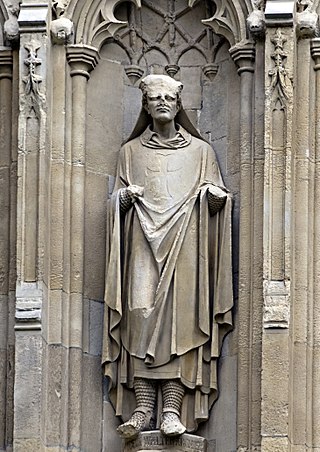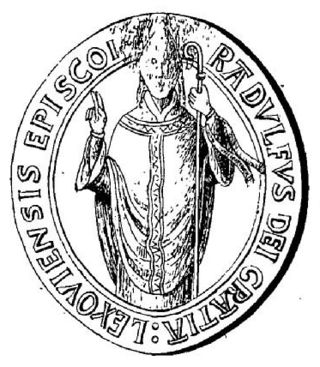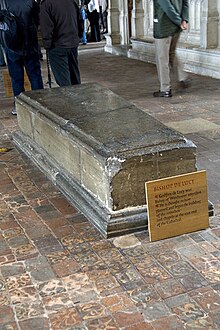
Hubert Walter was an influential royal adviser in the late twelfth and early thirteenth centuries in the positions of Chief Justiciar of England, Archbishop of Canterbury, and Lord Chancellor. As chancellor, Walter began the keeping of the Charter Roll, a record of all charters issued by the chancery. Walter was not noted for his holiness in life or learning, but historians have judged him one of the most outstanding government ministers in English history.
William de Mandeville, 3rd Earl of Essex was a loyal councillor of Henry II and Richard I of England.
Geoffrey Fitz Peter, Earl of Essex was a prominent member of the government of England during the reigns of Richard I and John. The patronymic is sometimes rendered Fitz Piers, for he was the son of Piers de Lutegareshale, a forester of Ludgershall and Maud de Manderville.
Geoffrey Ridel was the nineteenth Lord Chancellor of England, from 1162 to 1173.

Ralph de Warneville was the twentieth Lord Chancellor of England as well as later Bishop of Lisieux in Normandy.
Geoffrey was an illegitimate son of King Henry II of England who became bishop-elect of Lincoln and archbishop of York. The identity of his mother is uncertain, but she may have been named Ykenai. Geoffrey held several minor clerical offices before becoming Bishop of Lincoln in 1173, though he was not ordained as a priest until 1189. In 1173–1174, he led a campaign in northern England to help put down a rebellion by his legitimate half-brothers; this campaign led to the capture of William, King of Scots. By 1182, Pope Lucius III had ordered that Geoffrey either resign Lincoln or be consecrated as bishop; he chose to resign and became chancellor instead. He was the only one of Henry II's sons present at the king's death.

William de Longchamp was a medieval Lord Chancellor, Chief Justiciar, and Bishop of Ely in England. Born to a humble family in Normandy, he owed his advancement to royal favour. Although contemporary writers accused Longchamp's father of being the son of a peasant, he held land as a knight. Longchamp first served Henry II's illegitimate son Geoffrey, but quickly transferred to the service of Richard I, Henry's heir. When Richard became king in 1189, Longchamp paid £3,000 for the office of Chancellor, and was soon named to the see, or bishopric, of Ely and appointed legate by the pope.

Godfrey Giffard was Chancellor of the Exchequer of England, Lord Chancellor of England and Bishop of Worcester.

Peter des Roches was bishop of Winchester in the reigns of King John of England and his son Henry III. He was not an Englishman, but rather a native of the Touraine, in north-central France.
Nicholas of Ely was Lord Chancellor of England, Bishop of Worcester, Bishop of Winchester, and Lord High Treasurer in the 13th century.

Walter de Coutances was a medieval Anglo-Norman bishop of Lincoln and archbishop of Rouen. He began his royal service in the government of Henry II, serving as a vice-chancellor. He also accumulated a number of ecclesiastical offices, becoming successively canon of Rouen Cathedral, treasurer of Rouen, and archdeacon of Oxford. King Henry sent him on a number of diplomatic missions and finally rewarded him with the bishopric of Lincoln in 1183. He did not remain there long, for he was translated to Rouen in late 1184.
Richard de Lucy, Luci, Lucie, or Lusti, also known as Richard the Loyal, was first noted as High Sheriff of Essex, after which he was made Chief Justiciar of England.
Hugh de Puiset was a medieval Bishop of Durham and Chief Justiciar of England under King Richard I. He was the nephew of King Stephen of England and Henry of Blois, who both assisted Hugh's ecclesiastical career. He held the office of treasurer of York for a number of years, which led him into conflict with Henry Murdac, Archbishop of York. In 1153, Hugh was elected bishop of Durham despite the opposition of Murdac.
Richard of Ilchester was a medieval English statesman and prelate.

Josceline de Bohon or Bohun was an Anglo-Norman religious leader.
Richard FitzNeal was a churchman and bureaucrat in the service of Henry II of England.
Richard de la More was a medieval clergyman who was Bishop-elect of Winchester from 1280 to 1282.
William Cumin was a bishop of Durham, and Justiciar of Scotland.
Burchard du Puiset was a medieval Anglo-Norman clergyman and treasurer of the diocese of York. Either the nephew or son of Hugh du Puiset, the Bishop of Durham, Burchard held a number of offices in the dioceses of York and Durham before being appointed treasurer by King Richard I of England in 1189. His appointment was opposed by the newly appointed Archbishop Geoffrey, which led to a long dispute between Geoffrey and Burchard that was not resolved until the mid 1190s. After the death of Hugh du Puiset, Burchard was a candidate for the Hugh's old bishopric, but lost out in the end to another candidate. Burchard died in 1196.








